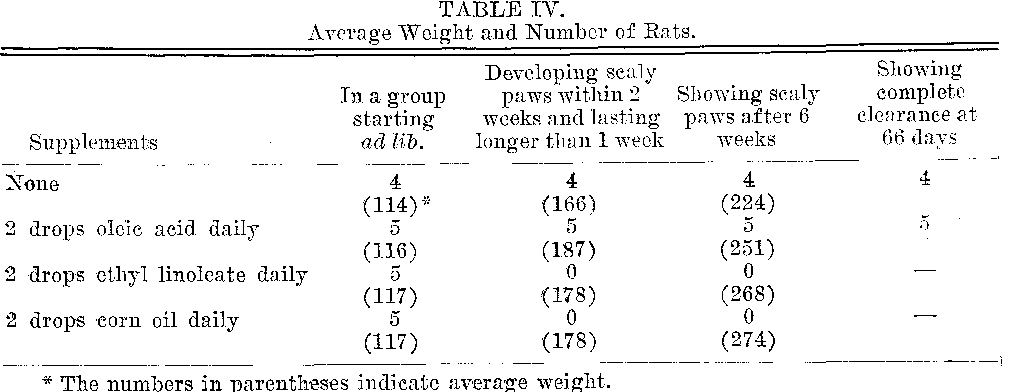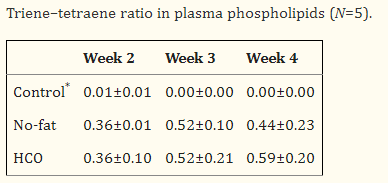Essential fatty-acid deficiency: spontaneous remission of symptoms on a fat-free diet(Rats)
-
https://www.cabidigitallibrary.org/doi/full/10.5555/19481402164
A series of experiments is described in which mature male rats weighing about 225 g. were given a fat-free diet of casein, sucrose and salt mixture supplemented with yeast or B vitamins and 1 drop of haliver oil weekly and the food intake restricted so that 50 per cent. of their original weight was lost in from 1/2 to 3 months. The rate were then given the experimental diet to appetite and symptoms such as scaling paws, typical of essential fatty-acid deficiency, appeared within about 2 weeks. The condition was cured in less than 6 weeks by addition of a supplement of maize oil or ethyl linoleate. Such a supplement included in the diet from the start of the experiment prevented the occurrence of the deficiency. A supplement of biotin, folic acid, inositol, p-aminobenzoic acid and nicotinic acid in the absence of maize oil or ethyl linoleate was not curative. In rats which showed signs of deficiency and which were given no supplement to the deficient diet, spontaneous remission of symptoms occurred within about 10 weeks from the time when the deficient diet was given to appetite, even when, from the onset of symptoms, the haliver oil was replaced by carotene, calciferol and α-tocopherol suspended in a medium containing no unsaturated fatty acid.
Rats which were given the fat-free diet to appetite throughout the experiment did not show any sign of deficiency at any time.
It is suggested that at least a limited amount of essential fatty acids is synthesised in the bodies of these mature rate.-F. C. Russell.


-
Interesting, maybe this suggests mead acid needs some time to upregulate?
-
Apparently so. They forced the symptoms by reducing the calories and after they switched to ad libitum it took a while for the symptoms to disappear, suggesting that ad libitum from the start didn't cause any symptoms apart from the increase in mead acid.
In another study with a similar diet and the addition of 4% hydrogenated coconut oil, there were no symptoms even though the amount of mead acid was higher than a fat-free diet. They finished the experiment and assumed that one day the symptoms would appear
"present results would suggest that feeding with a 4% HCO diet without EFA or a fat-free diet (No-fat diet) for 4 weeks equally increased the concentrations of 20:3n9 and decreased 20:4n6 and EFAs in most organ and tissues, but did not retard body growth or cause other clinical symptoms of EFA deficiency in rats. Beyond this feeding period, clinical signs presumably would have been observed because a value of triene/tetraene ratio of 0.4 is generally the level at which clinical evidence of EFA deficiency is detected"

-
Very nice find, thanks.